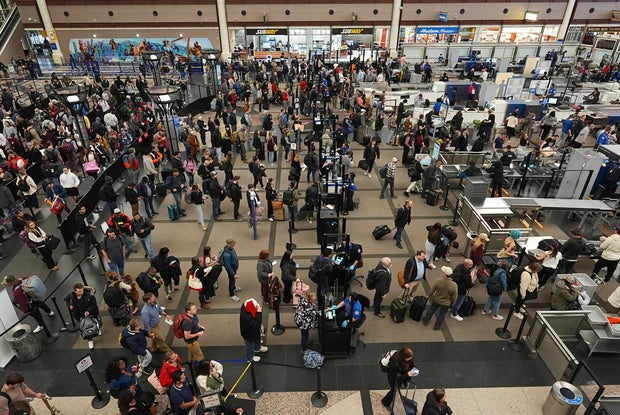CBS News
Will the solar eclipse affect animals? Veterinarians share pet safety tips for the 2024 show

With around 180 million people living in or near the 2024 solar eclipse path of totality, many pet owners may be wondering how the eclipse may impact animal behaviors and how their pets might react.
Veterinarians said they’ve been fielding questions from some concerned pet owners about the eclipse’s impact on animals. Ultimately, there isn’t a clear answer for pet owners because eclipses happen so infrequently. Researchers do plan to watch animal reactions during the April eclipse to learn more about how it affects animals.
“There’s not a lot of scientific research done on this topic of animals and eclipses mostly because they don’t come often,” said American Kennel Club Chief Veterinary Officer Dr. Jerry Klein. “And a lot of it’s just been anecdotal reports and just volunteering information.”
Will the solar eclipse affect animals?
Though there isn’t a lot of information out there, veterinarians and animal researchers do have some idea how the eclipse will impact dogs, cats and more.
“Most animals will be overall unaffected by the eclipse, but pet owners may notice brief periods of confusion, and dogs and cats may exhibit fear and confusion,” said Dr. Katie Krebs, a veterinarian and professor at University of Pennsylvania’s School of Veterinary Medicine.
Pets may hide, howl, pace or pant during the eclipse, Krebs said. As the sky darkens, some pets may start their nighttime routine early.
The average indoor dog or cat is likely not going to be affected by the eclipse, said Dr. Rebecca Greenstein, veterinary expert with pet care company Rover.
“So owners should take heart and take comfort in knowing that,” Greenstein said.
Why do solar eclipses affect animals?
It’s not so much the eclipse that affects pets, but the behavior of people, Klein said.
“They’ll take their cues from us,” Klein said. “So if they’re kept indoors and we don’t try to force them into a situation that’s peculiar, there should be minimal to none as far as reactions.”
Many people will gather at eclipse parties and those large gatherings can impact pets if they’re brought along, Klein said. The travel, noise and crowds can be stressful for animals.
Some animals that depend more on the light-dark cycle, like birds, may be more affected because the sky will darken during the eclipse, Krebs said.
“Things like fireworks and thunderstorms are probably a much more significant phenomenon than an eclipse that’s lasting only a few minutes,” Greenstein said.
Can animals look at the eclipse without going blind?
Owners should not force pets to look at the sun, Klein said. Animals generally know not to stare at the sun themselves — they’ve learned that doing so can temporarily blind them, leaving them vulnerable.
“Dogs know that if something hurts them, they probably shouldn’t do it,” said Klein. “So left to their own devices, dogs are probably not going to stare at the sun.”
Pets may look up if they see the people around them are preoccupied with looking up at the sky, vets said.
“Dogs follow your cues, so if you’re preoccupied with looking up, your dog is looking to your cues to figure out how to behave,” Greenstein said. “So this may be a time to either not bring them along, or if you are, to reassure them with their favorite toy or treat and just keep them preoccupied with what’s going on at ground level.”
Pet owners do not need special eclipse glasses for their dog or cat, Krebs said.
If you have a pair of eclipse glasses around, be careful not to leave them unattended with your pet, who may chew on or eat them, Klein said. Eclipse glasses that have scratches or punctures should not be used.
Should you keep your pets inside or outside during the solar eclipse?
Veterinarians agree that it’s likely best to keep pets inside during the eclipse, especially if they’re stressed by crowds or events like storms or fireworks.
“If possible, keep them indoors in a comfortable environment where they will feel more secure because the feeling of this is probably the most important thing,” Klein said.
Owners planning to go to eclipse events should be respectful of their pet’s boundaries.
“Not all animals do well with large crowds or with you being distracted with other things, so leaving them at home or calling a trusted pet sitter are probably the best bet,” Greenstein said.
At home, owners can try distracting a pet with a favorite toy, vets said. Pets who are often anxious may benefit from anti-anxiety medication during the eclipse, but owners should check with their veterinarian for specifics before giving their dog or cat any medication, Krebs said.
“If you plan to stay home during the eclipse, your pet may seek out extra attention or comfort, so providing them with extra comfort and reassurance may help,” Krebs said.
More pet safety tips to keep in mind
If you’ve decided to take your dog to an eclipse event, it’s important to make sure they’re microchipped with current info in case they get stressed and run away, Klein said. While there, make sure they’re well controlled on a leash.
“By and large, we’re not thinking this represents any major danger, but definitely pet owners should use their judgment,” Greenstein said.
CBS News
Comfort meets style with “grandma heels”

Watch CBS News
Be the first to know
Get browser notifications for breaking news, live events, and exclusive reporting.
CBS News
The science behind yawning and its mysterious behavior

Watch CBS News
Be the first to know
Get browser notifications for breaking news, live events, and exclusive reporting.
CBS News
As government shutdown looms, AAA predicts holiday travel record

Drivers and airline passengers without reindeer and sleighs better make a dash for it because it’s beginning to look like another record for holiday travel in the U.S. as the government shutdown looms.
The auto club AAA predicts that more than 119 million people will travel at least 50 miles from home between Saturday and New Year’s Day, which would top the previous holiday-season high set in 2019. The two weekends on either side of Christmas look to be some of the most crowded times on the road and at airports.
Trade group Airlines for America also foresees record travel, saying it expected U.S. airlines to carry 54 million passengers during a 19-day period that started Thursday and ends Monday, Jan. 6. The number would represent a 6% increase over last year.
A government shutdown that could start as soon as Saturday would likely be too close to the holidays to immediately affect flights and airport operations, but that might change if a shutdown dragged on.
David Zalubowski / AP
What will be the busiest travel days?
Airlines expect to have their busiest days on Friday and Sunday, and on Dec. 26, Dec. 27 and Dec. 29. Flight traffic is expected to be light on both Christmas Day and New Year’s Day. The slowest U.S. air-travel day this year — by a wide margin — was Thanksgiving Day.
The Transportation Security Administration expects to screen 40 million passengers over the holidays and through January 2.
About 90% of Americans traveling far from home over the holidays will be in cars, according to AAA.
“Airline travel is just really high right now, but most people do drive to their destinations, and that is true for every holiday,” AAA spokesperson Aixa Diaz said.
Gasoline prices are similar to last year. The nationwide average Thursday was $3.05 a gallon, down from $3.08 a year ago, according to AAA. Charging an electric vehicle averages just under 35 cents per per kilowatt hour, but varies by state.
Transportation-data firm INRIX says travel times on the nation’s highways could be up to 30% longer than normal over the holidays, with Sunday expected to see the heaviest traffic. Boston, New York City, Seattle and Washington, D.C., are the metropolitan areas primed for the greatest delays, according to the company.
Weather and other wildcards
Because the holiday travel period lasts weeks, airports and airlines typically have smaller peak days than they do during the rush around Thanksgiving, but the grind of one hectic day followed by another takes a toll on flight crews. And any hiccups — a winter storm or a computer outage — can snowball into massive disruptions.
That is how Southwest Airlines stranded 2 million travelers in December 2022, and Delta Air Lines suffered a smaller but significant meltdown after a worldwide technology outage in July caused by a faulty software update from cybersecurity company CrowdStrike.
Many flights during the holidays are sold out, which makes cancellations even more disruptive than during slower periods. That is especially true for smaller budget airlines that have fewer flights and fewer options for rebooking passengers. Only the largest airlines, including American, Delta and United, have “interline agreements” that let them put stranded customers on another carrier’s flights.
This will be the first holiday season since a Transportation Department rule took effect that requires airlines to give customers an automatic cash refund for a canceled or significantly delayed flight. Most air travelers were already eligible for refunds, but they often had to request them.
Passengers still can ask to get rebooked, which is often a better option than a refund during peak travel periods. That’s because finding a last-minute flight on another airline yourself tends to be very expensive.
“When they rebook you, they will pay for the fare difference. If my flight to visit grandma that I booked six months ago for $200 gets canceled, and I turn around and book a flight four hours from now for $400, I have to pay that difference,” said Sally French, a travel expert at consumer-affairs company Nerdwallet.
People traveling on budget airlines with fewer flights and no partnerships with other carriers may face a difficult choice in the event of a canceled flight.
“They will put you on the next outgoing Spirit or Frontier flight, but that could be a while from now. Sometimes waiting three days for that next flight is not going to work for you,” and paying more to rebook on a big airline might be worthwhile, French said.
Some airlines are taking advantage of a provision in the new Transportation Department rule that defined a significant delay as three hours for a domestic flight and six hours for an international flight. According to Brett Snyder, who runs the Cranky Flyer website, airlines that previously issued refunds for shorter delays — Delta, United and JetBlue, for example — are now using the government standard.
Delayed flights increase the risk that bags will get lost. Passengers who get separated from their bags should report it to the airline and ask what the airline will cover.
Would a government shutdown affect flights and airports?
A government shutdown could occur if Congress doesn’t pass a funding bill with a midnight Friday deadline. Most TSA workers at airports, air traffic controllers and customs agents are considered essential and would be required to work without pay in the event of a shutdown.
More uncompensated workers might call out sick the longer a shutdown lasts, which could lead to longer security lines and other delays. That appeared to be the case several weeks into a government shutdown that started in December 2019.
About 59,000 of the TSA’s 62,000 workers are considered essential and would continue working without pay during a shutdown, the TSA said in an email sent to CBS News. But a shutdown could cause delays at airports over the holidays, the agency warned.
“While our personnel have prepared to handle high volumes of travelers and ensure safe travel, an extended shutdown could mean longer wait times at airports,” TSA spokesman Carter Langston said in a statement.
AAA advises travelers to “continue with their holiday plans, even if the shutdown materializes,” spokesperson Diaz said. “Airport operations will continue as normal, but perhaps run a bit slower than usual, so travelers should be aware of that.”
Planning ahead for 2025
Airline fares were up 4.7% in November, compared with a year earlier, according to U.S. government figures. But early 2025 is a good time to start planning next year’s trips, including for spring breaks and summer vacations.
“Because travel is so popular, you’re not going to find anything that feels very rock-bottom, but January and February are great times to plan for March, April and May,” Laura Motta, an editor at travel-guide publisher Lonely Planet, said. “If you want to go to Paris in the spring, you need to be thinking about that in January.”
Mike Stewart / AP









